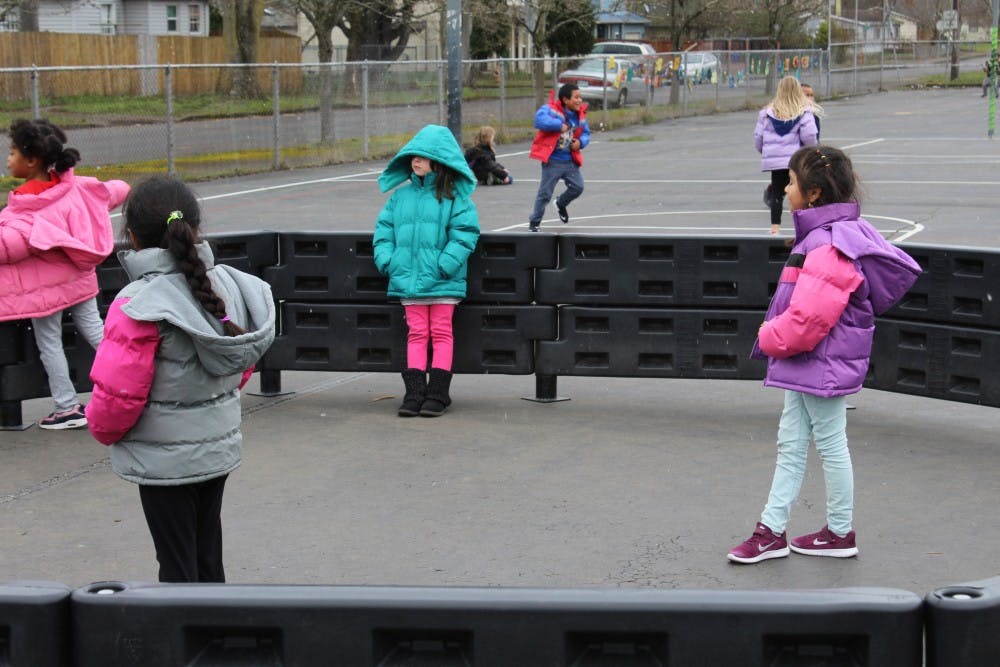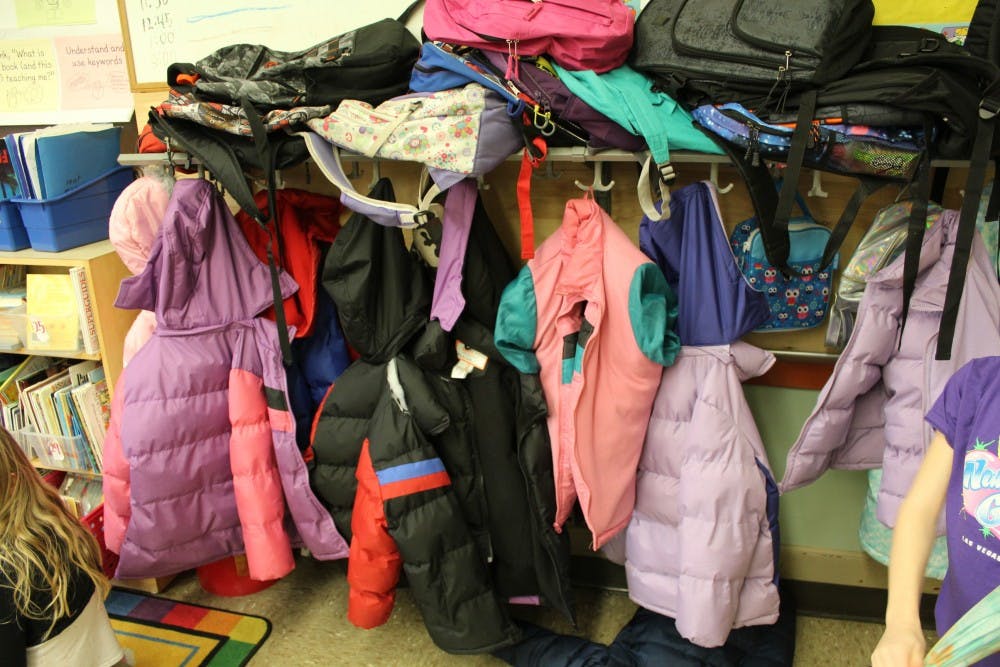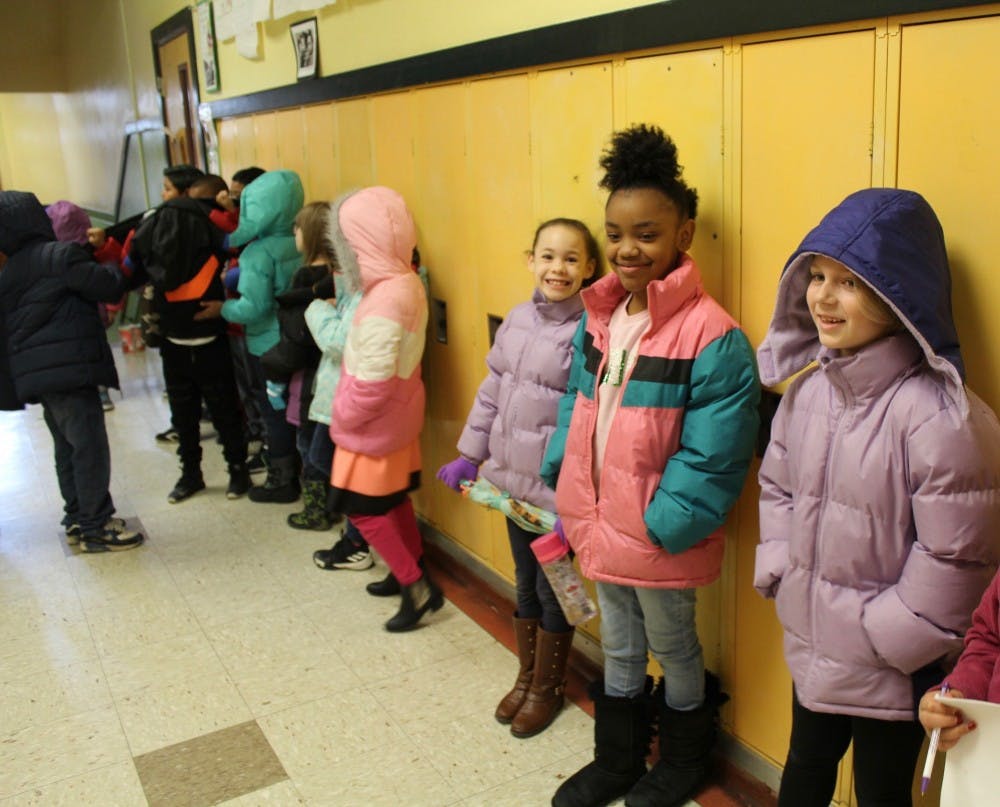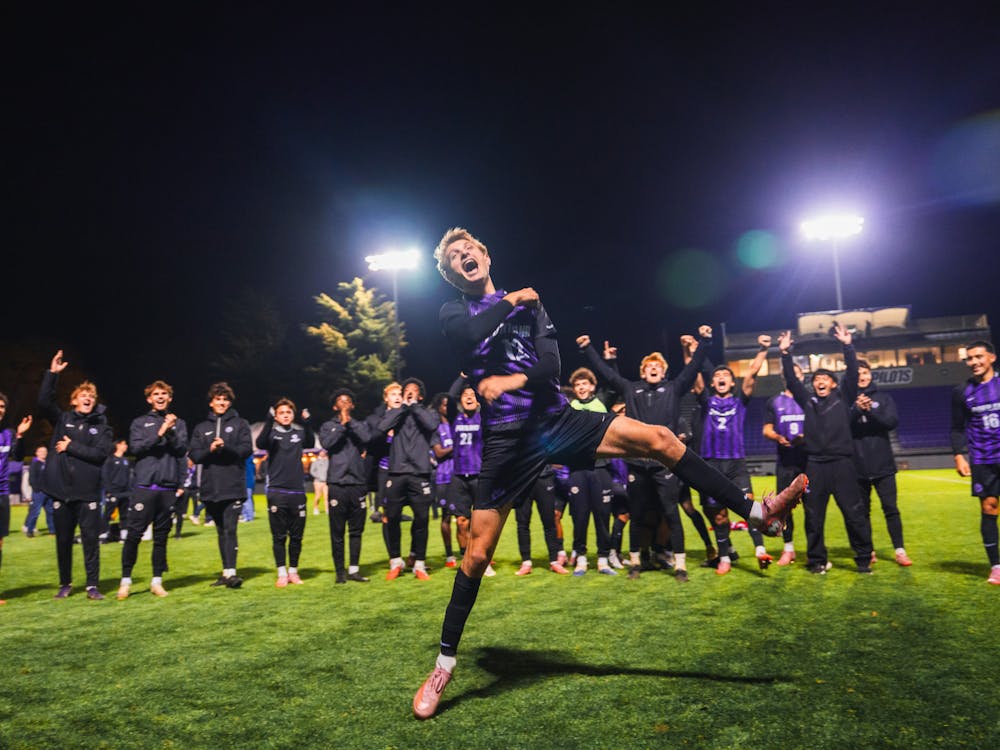Hear this story in podcast form:
At 12:45 p.m., Robin Cooper lets her second-grade class out to recess. The kids run, screaming and laughing, to the basketball court, the monkey bars, the slide. It’s a cold day in February at Cesar Chavez School, a kindergarten through eighth grade school in North Portland. A few snowflakes drift down from a gray sky.
The second-graders barely notice the cold. Many of the kids are bundled in matching bright puffy coats that pop in color against the cement. Dark blue, lavender purple and bright pink streak across the playground.
Many students at Cesar Chavez used to have trouble going to recess on cold days like this. The school has many kids whose families can’t afford coats, even though temperatures in Portland were frigid this past winter. Cesar Chavez is a Title I school, meaning that almost all of the students in the school come from low-income homes.
But the coat problem was solved, at least for this year, when UP senior Itzel Moreno-Vega applied for an Operation Warm grant in October to get a new coat for every Chavez student. And she got it. In early February, Operation Warm, a charity that produces and donates coats to low-income communities, gave 625 brand-new coats to the students at Cesar Chavez.
The coats allow the kids — including those who used to wear only sweatshirts outside or dig through the lost-and-found for extra layers — to play at recess without worrying if it’s cold. For many of the students, this was the first time they received something that was brand-new and high-quality that they could call their own.
“I think it’s the greatest thing I’ve ever seen,” Cooper said. “I think it’s the greatest thing I’ve ever seen for our community. I think what she did is remarkable.”

Moreno-Vega first heard the story that motivated her to act from a parent. The social work major started working with Latino Network last September for a year of fieldwork required for graduating. Latino Network, a culturally-specific organization that focuses on empowering youth, had placed her at Chavez to work with parents.
In the fall, she met with a few parents to ask them what they felt their needs were and how the school could better support them. One parent told her a story that stuck with her.
The story was this: The parent knew of a few students who couldn’t make it to two weeks of school last year because it was too cold outside and the students didn’t have coats. The students couldn’t make it to the bus stop and wait for their bus in 20-degree temperatures.
“After hearing that, I just thought, that’s such an easy solution, a coat,” Moreno-Vega said. “It’s just a necessity.”
Moreno-Vega started noticing that a lot of kids at Cesar Chavez didn’t have coats at recess, even though the temperatures were dropping in Portland. Cooper agreed that she often had second-grade students who would go out to recess without a coat.
“I have kids that probably shouldn't have gone to recess because what they’d wear is just a sweatshirt. But they would still go,” Cooper said. “But they probably shouldn’t have. Or they would go to lost-and-found and try to wear something from lost-and-found, just to wear it out to recess.”
In October, Moreno-Vega began researching organizations that could provide coats to kids in need. She decided to apply for Operation Warm’s coat wish list because they manufacture coats in-house and the students would receive new coats, not second-hand ones. One of the questions the application asked was, “what would a coat mean to your community?”
“I answered that explaining that little things like a coat can really support a kid, can really make them feel like they’re being valued and supported, especially if that coat can get them to school, can protect them from the cold at recess,” Moreno-Vega said. “Especially a new coat. A lot of individuals in poverty don’t get new things. Them being able to pick it out and pick out their right size, not something that’s too big or too tight, that’s really empowering. It can have a really positive effect later on.”

Moreno-Vega didn’t expect to receive the grant. The Operation Warm grants are competitive and the organization receives thousands of applications for the grants each year. Applying for such a large amount — 550 coats — made it seem to Moreno-Vega that receiving it would be impossible.
But on Jan. 11, Moreno-Vega got a call that Cesar Chavez had received the grant. The coats were delivered to the school and passed out on Feb. 1. The Portland Public School district filmed the day when teachers and school workers handed out the brightly-colored coats to the kids.
“I don’t really know how to describe the moment other than there was just a lot of joy,” Moreno-Vega said. “A lot of people were really happy about it. A lot of parents were really thankful and grateful.”
Operation Warm sent 625 coats, which was 75 more than Moreno-Vega had asked for. Students could pick out the color and size they wanted, and the extras were given out to parents and younger children.
“People who don’t need things so badly don’t get that excited and gracious for it,” Moreno-Vega said. “Kids were jumping up and down when I told them. It was a moment that really connected the community.”
After the kids received the coats, Cooper said some students didn’t take them off for the rest of the day.
“I have been in this community for 25 years and, yes, our kids have been given things but usually they're second-hand things,” Cooper said. “This is one of the first times my whole class got a coat that they will wear, that they’re proud of, that’s brand new. They had the tags on them. They were so thrilled. They came back into the class and they wouldn’t take them off.”

Liliana Gomez, a contract worker from Latino Network who works at Cesar Chavez, agreed that having something new was unusual for most of the students at Chavez. Gomez had seen coat drives done at the school in the past, but none of them were this big and they didn't include coats that were new. Getting a new coat, Gomez said, is empowering to kids who live in poverty.
“Being able to get something that’s like a brand new coat as opposed to a used coat makes them feel like they matter as much as kids who get new coats,” Gomez said.
Moreno-Vega received several emails from teachers and parents thanking her for what she did, but Moreno-Vega didn’t see the grant as something beyond her job description. The grant was just another way to aid the community — not unlike how the teachers aid the community every day.
“Whenever they would thank me I’d thank them back because we’re all working together for the same goal,” she said.
Moreno-Vega grew up in St. John’s, down the street from Cesar Chavez. While she didn’t go to Chavez, she was thankful that the practicum program allowed her to give back to an area of Portland that she came from. As a first-generation student, Moreno-Vega always has the family members and community that helped her get to college in the back of her mind.
“I’ve always been like, ‘what about all these people I left behind?’ like my family members who didn’t get these opportunities who are equally or more deserving,” she said. “I’ve always felt this obligation and I’m very fortunate that through the practicum program I’ve felt like I’m fulfilling my obligation.”
In the future, Moreno-Vega hopes to work in a type of social work that includes empowering youth or working with parents. Social work, Moreno-Vega admitted, is a tough job. It can be fulfilling, but can also be emotionally draining. This experience is a reminder that the work is worth it.
“The experience with the coats, that’s just a moment that’s going to continue to inspire me throughout my career,” she said. “I feel like in this field there are so many lows and not many highs, unfortunately. I hope this inspires me and keeps me going.”
Hannah Sievert is the editor-in-chief of The Beacon. She can be reached at sievert19@up.edu or beacon@up.edu.








